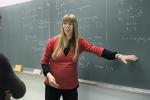
Kaisa Matomäki
- Born inFinland
- Studied inFinland
- Lives inFinland
Interview
Photo Copyright: Noel Tovia Matoff, www.matoff.de
This is an EXCERPT of the interview from the catalogue “Women of Mathematics Throughout Europe, a Gallery of Portraits”, published in Verlag am Fluss 2016, [email protected], and featured among thirteen portraits in the corresponding exhibition http://womeninmath.net. See also the EWM newsarticle.
We would like to thank Sylvie Paycha, Sara Azzali, Alexandra Antoniouk, Magdalena Georgescu, and Noel Tovia Matoff for allowing us to use the interview excerpts. Moreover, we acknowledge the work of Veronica Corona and Joana Grah for editing the interview excerpts.
Were you encouraged by your family, friends or by other people around you in choosing to do mathematics?
As a child, I learned a lot from my brother who was 4 years older than me, and who would tell me about what he was learning at school. He’s now a statistician working at the Turku University hospital, where he takes care of the statistics for the medical researchers. My parents, who have now retired – my mother was an elementary school teacher, my father a farmer – were very supportive. On the one hand they were proud that I could attend a special school for gifted children, on the other hand, they missed me, lamenting that the school was so far from our home town. But I was happier at this school than I had been at my previous school, where I had suffered from being different from my school mates. I enjoyed the atmosphere at that special school, and have kept friends from that time, some of whom studied in Helsinki, where they are now working. Among the 20 pupils in the class, only 4 were women; the proportion has probably increased since them.
In retrospect, are you happy to have chosen mathematics or do you have some regrets? For you, what are the joys of mathematics? What are the hardships?
I have no regrets, since mathematics is what I enjoy doing. I like doing research, having new ideas, but do not like getting stuck on a problem, which is a source of frustration. To have a new idea is exhilarating, I get excited and can hardly sleep. I am eager to go on thinking about it, and sometimes go on doing so at night.
When I get stuck, I try to leave the problem aside for a while and to think about something else. I have many collaborators who can help me overcome the problem. Ideas go back and forth between me and my collaborators, some of whom may well find a solution to a problem I couldn’t solve.
What would you recommend to a young woman in your country wanting to start a career in mathematics?
I would tell her to just try it out, and not to care too much about other people’s comments. I would encourage her if she showed some enthusiasm and her credentials were good. As a matter of fact, I would tell a man or a woman the same thing.
Could you write a few lines describing your topics of research in a manner understandable to non-experts?
Among other things, I am interested in the distribution of prime numbers; the larger the numbers, the scarcer the prime numbers. However, one still expects that there are infinitely many twin prime numbers, namely pairs of prime numbers of the form (p,p+2), such as (5,7) and (17,19). This is a major unsolved conjecture in number theory, but for instance one does know that there are infinitely many primes p such that p+2 is either a prime or a product of two primes. Another famous unsolved problem in the area is the Goldbach conjecture, stating that each even integer at least 4 is the sum of two primes (e.g. 10 = 3+7 and 16 = 5+11 = 3+13). It is known that every odd integer at least 7 is a sum of three primes. Some of my recent research concerns the combination of these two approximations of the famous conjectures – my collaborator Fernando Xuancheng Shao and I showed that each large enough odd integer is a sum of three primes p1 + p2 + p3, where each prime pi is such that pi + 2 has at most two prime factors. These are relatively easy questions to formulate, easy problems to state. I do not know of any practical applications, but there might be some in cryptography for some related problems.
